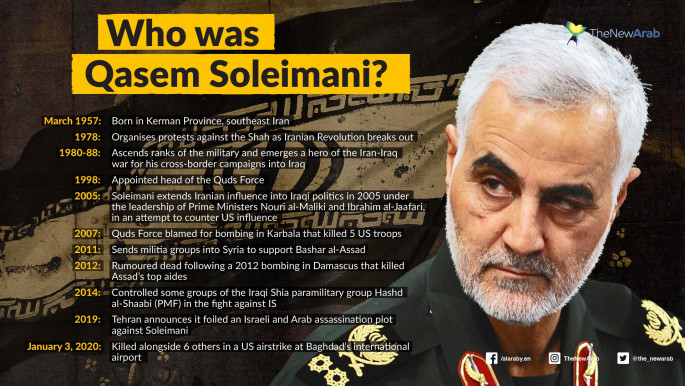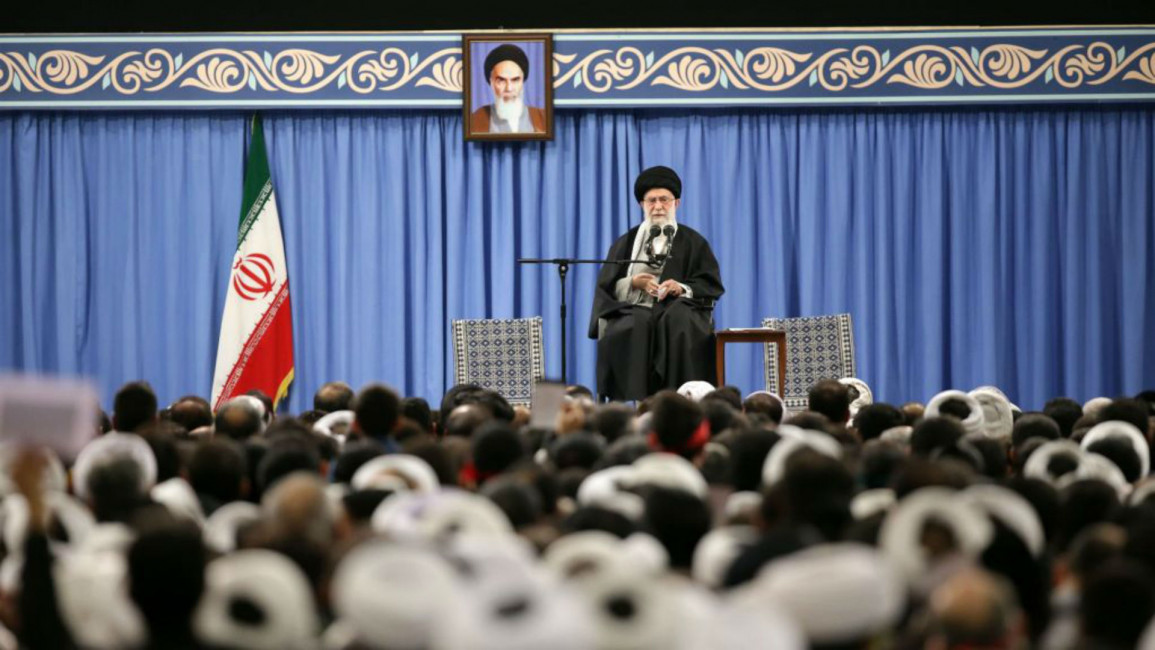
Disaster averted. But can there be peace between Iran and the US?
The first week of the new decade has been a living hell for the people of Iran and all those worried about the prospect of a full-on military confrontation between Tehran and Washington.
On Friday, 3 January, Iranians woke up to the utter shock of the United States having assassinated General Qasem Soleimani, the mastermind of Iranian interventions in the region and easily the most renowned figure in modern military history of the Middle East.
Ever since May 2018, when President Trump withdrew from the Iranian nuclear deal, the two sides have been engaged in a low-level skirmish involving proxy conflicts and mysteriously unclaimed attacks.
By assassinating Soleimani, Trump massively raised the stakes and started a dangerous game of brinksmanship that had us all worry about the possibility of war. Iran's Supreme Leader, Ayatollah Khamenei, was quick to promise a "severe revenge" and for a full week, worries about the Iranian reaction and the US response to it had Iranians on the edge of their seats.
A look across Persian-language social media and family WhatsApp groups confirmed this; the sentiments for and against Soleimani differed, but the common denominator was worry that war might break out.
The Iranian response finally came on 8 January, and led to immediate panic. Supermarkets in some Iranian towns were filled with people stocking up in case of war.
 |
When the dust settled, we saw that the Iranian response had been, in fact, masterfully prudent |  |
But when the dust settled, we saw that the Iranian response had been, in fact, masterfully prudent. It had fired a dozen round of missiles on bases in Iraq used by the US forces, leading to a face-saving spectacle that placated the hardliner base of the regime in Iran and other countries; yet at the same time caused no casualties.
Iranians breathed a sigh of relief when Trump and his team left the White House without speaking on that long night. On the morning after, the US president confirmed that there had been no casualties; Iraqi or American. He brandished the US' preponderant economic and military power, but declared that the only response to Iranian actions will be, at least for now, economic sanctions - which by this point are mostly meaningless since there is little left in Iran that has not already been sanctioned.
The disastrous possibility of war has been averted, for now. The calculated prudence of the Iranian response won praise, even from many of the reformist critics of Ayatollah Khamenei inside the country. Mohammadreza Zaeri, a reformist cleric, spoke for many when he tweeted: "Dear Islamic Republic! If you can act so beautiful, calculated and measured on foreign policy, why don't you do the same in domestic affairs?"
 |
|
| [Click to enlarge] |
The calculated response of Iran was no accident.
Ayatollah Khamenei, the 80-year-old supreme leader is many things, but he is not suicidal. Orientalist commentary that associated Khamenei and his republic with "Shia martyrdom complexes" or other hackneyed cliches could hardly be more wrong.
Khamenei's political history, absent from most analyses of Iranian actions, is part of the clue here. Ever since its foundation in 1979, the Islamic Republic has had two general wings: One which emphasises anti-capitalism, revolutionary Islamism and an anti-western foreign policy; and another which is more pro-capitalist, values moderation and - at least in the days of the Cold War - prioritised anti-communism over anti-westernism.
It might be a surprise to many, but Ayatollah Khamenei has historically had more in common with the latter, i.e. more the moderate wing. Khamenei knows the price of a full-on direct military confrontation with the US, and he will do all he can to avert it.
 |
It's a mistake to imagine we are back to the pre-Soleimani assassination status quo |  |
Such strategic prudence will only get Iran so far, however. Khamenei's contradiction is that he presides over a movement of revolutionary Islamists in the region which can act in "resistance" and representation of Shia minority interests in the Arab world, while lacking an attractive blueprint to offer for the future of these countries.
Iran's own Islamic Republic is mired in such deep economic straits and suffers from such deep ideological crises that there is hardly any enthusiasm for replicating it across the region. Iran's expansion to countries in the region has been mostly to avoid besiegement by US-friendly states and promote its own stability.
Writing about the goals of Soviet leader Joseph Stalin in the years after World War II, the seminal Cold War historian John Lewis Gaddis said the man's goals were "security for himself, his regime, his country and his ideology, in precisely that order." Ayatollah Khamenei is on somewhat similar grounds with a possibly different order of priorities - and a much weaker position compared to the triumphant post-war Stalin.
What next then? It's a mistake to imagine we are back to the pre-Soleimani assassination status quo. Trump is now, and forever will be, the man who brazenly killed General Soleimani. Any public deal with him would be an affront to the dignity of Khamenei and his men.
Read more: 'Operation Martyr Soleimani': Iran's missile strike against US in Iraq was more symbolic than lethal
Still, the Islamic Republic's history and imaginary has a full-on repository of dignified resistance when dealing with its enemies. Not for nothing, did Ayatollah Khamenei once translate a book not on Imam Hussein - the famed Shia Imam who was martyred in the plains of Karbala in 680 when he fought the ruling Ummayid caliph - but on Hussein's older brother; Imam Hassan, who had made peace with the father of the said caliph.
The last years of the Iranian regime's founder, Ayatollah Khomeini, included his bitter acceptance of a ceasefire with the Baathist regime of Iraq, the same regime he had promised to fight to death. Khomeini likened the inking of the peace with Saddam, to "drinking a poison chalice," forever leaving the way open for compromise for the future leaders of the Islamic Republic. If Khomeini had done it, everyone could.
Prospects for a big, showy Iran-US deal which Trump seems to have in mind are quite dim, however. As Dina Esfandiary points out "there is much bad blood and few channels of communication".
 |
Prospects for a big, showy Iran-US deal which Trump seems to have in mind are quite dim |  |
Still, if we look at the infamous 12-point demands that Trump's secretary of state, Mike Pompeo raised with Iran, there are many that Tehran could acquiesce to. It could release US citizens, heavily limit its enrichment of uranium (just as it had under the previous Iran deal), sign the additional protocols of the International Atomic Energy Agency which will allow heightened scrutiny of Iranian facilities.
It could also come to an understanding with neighbours such as Saudi Arabia and the United Arab Emirates. It was Tehran after all who offered non-aggression pacts to Riyadh and Abu Dhabi. But a "grand bargain" between Tehran and Washington, which Tehran has offered many times in the past, will now have to wait. Much more likely, is quiet understandings and back-channel talks that will aim at stopping a war that neither side wants.
This disaster having been averted, Trump and Khamenei are still both walking on tightropes; one concerned about the survival of his very regime; the other having to deal with election year calculations. For the prospect of war to go away seriously, we'll need a broader rapprochement which will continue to be elusive for now.
Arash Azizi is a writer, translator and PhD candidate at NYU.
Follow him on Twitter: @Arash_Tehran
Opinions expressed in this article remain those of the author and do not necessarily represent those of The New Arab, its editorial board or staff.



